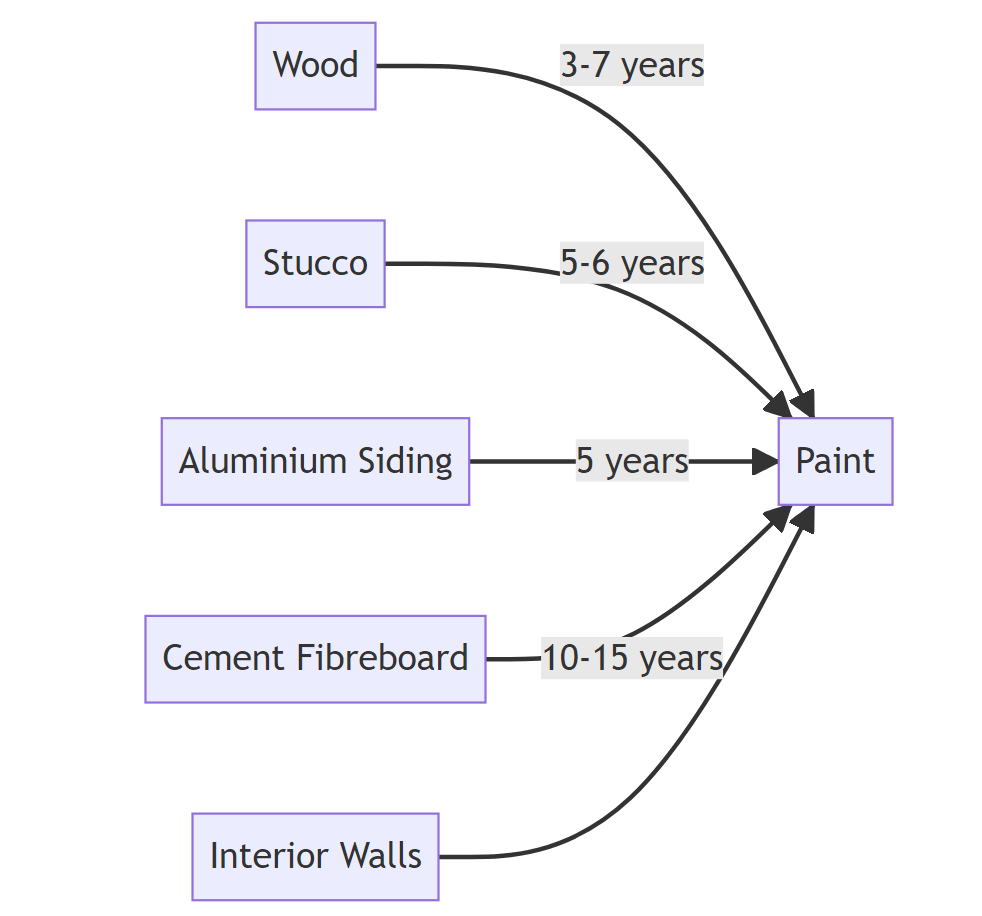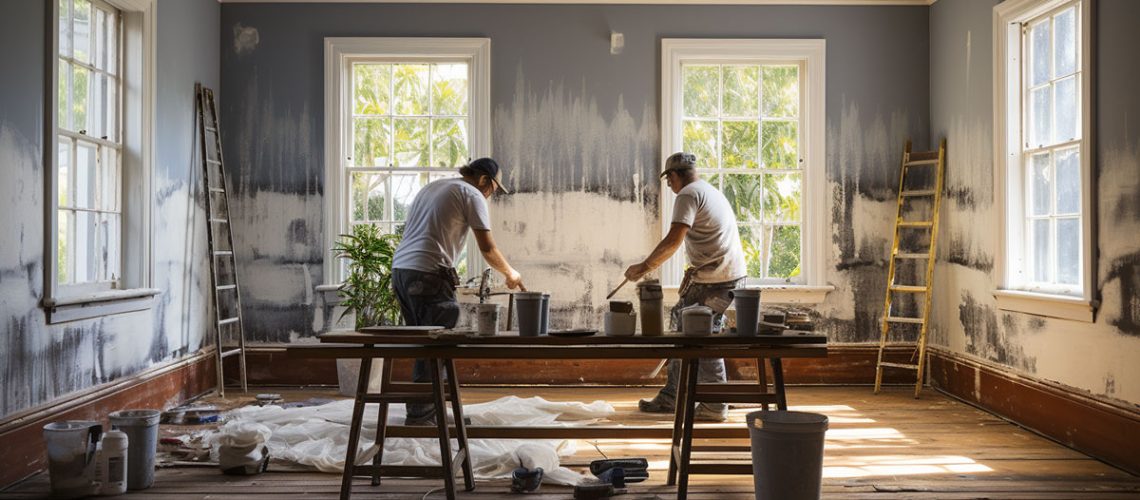Maintaining the appearance and condition of your house involves various tasks. And one of the best ways to do that is through repainting. The question is, how often should you paint your house?
Determining how often to repaint your house can sometimes feel challenging. In this quick guide, we’ll try to answer that question. We’ll also explore the factors influencing how frequently you must repaint your home. Let’s dive in!
How Often Should You Paint the Outside of Your House?
You should repaint your house’s exterior every 5 to 10 years. This helps maintain your home’s appearance and curb appeal, giving it a fresh and well-maintained look. This helps maintain your home’s appearance and curb appeal, giving it a fresh and well-maintained look.
Regular repainting also protects the exterior surfaces from weathering, moisture, and UV damage, preventing potential structural issues. Lastly, it allows you to address any paint issues like peeling, cracking, or blistering, update your home’s colour scheme, or keep up with the current design trends.
How Often Should You Paint the Inside of Your House?
While your home’s interior doesn’t have to endure the same harsh conditions as its exterior, that doesn’t mean it needs fewer repainting sessions. In fact, since you’ll spend most of your home time inside, you might have to repaint it more often. Thus, repainting your home’s interior is typically recommended every 5 to 7 years.
Remember that this recommendation can vary depending on room usage, wall surface, and personal preference. For instance, high-traffic areas or children’s rooms may require more frequent retouches.
How Often Should You Repaint Rental Properties?
Regarding rental properties, the repainting frequency depends on a few factors. Experts like Dupaint recommend you repaint rental homes every 5 to 7 years. This helps keep the property fresh and attractive.
Still, how frequently you repaint rental homes will depend on several factors. For example, common areas like hallways and public restrooms may require more repainting sessions. Thus, it would help if you regularly kept an eye on the condition of the paint to ensure your properties look nice and well-maintained.
Factors Affecting Painting Frequency
Determining how often to paint your house will still depend on certain factors. These include:
Types of Surfaces
Different materials require different maintenance levels, affecting how frequently you must repaint them. For instance, wood siding must be repainted every 3 to 7 years. In comparison, stucco’s paint can typically last around 5 to 6 years.
On the other hand, aluminium sidings can last around five years between paint jobs. Meanwhile, newer materials like cement fibreboard can hold paint for 10 to 15 years. Lastly, the type of paint and wall condition will also play a significant role in interior walls.

Impact of Climate
Weather conditions greatly influence the lifespan of your paintwork. High humidity can cause the paint to peel, while extreme temperatures can lead to cracking and chipping. Homes that get lots of direct sunlight might experience paint fading faster. Coastal homes exposed to salty sea air may require more frequent repainting due to increased corrosion.
Quality of the Previous Paint Job
The longevity of your paint also depends on how well the previous job was done. When correctly applied, high-quality paint can last longer than their low-quality counterparts. Also, prepping the area is equally important. In fact, Taubmans themselves dispelled the myth that prepping is optional. If you see signs of peeling, fading, or chipping, then either low-quality paint was used, or the surface wasn’t adequately prepared.
Signs of Wear and Tear
Regular inspections can help identify when it’s time for a new coat. Visible signs that you may need to repaint include discolouration, mould growth, and peeling or cracking paint. Keep an eye out for these symptoms of wear and tear. And be proactive with touch-ups to ensure your home continues to look its best. This can be particularly important nowadays with many people using their homes as a business location for ‘work from home’ arrangements, you don’t want visible signs of wear and tear on your walls coming through in a Zoom meeting.
Maintenance and Cleaning
Regular maintenance and cleaning are pivotal in prolonging the lifespan of your home’s paintwork. Not only will doing so keep your home looking fresh and well-maintained, but it will also allow you to detect early signs of damage that may indicate the need for touch-ups or full repaint.
Start by regularly cleaning your home inside and out, washing your house’s exterior periodically to remove dust, grime, and mildew accumulated over time. Using a garden hose to rinse these away gently will do. However, use a mild detergent solution for more stubborn dirt or algae.
As for your home’s interior walls, you can use a microfibre cloth with sugar soap or mild detergent.
Recommended Lifespan of House Paint
How long house paints last varies depending on several factors, including paint quality, surface preparation, and environmental conditions. For example, top-tier acrylic paint might last up to 15 years, while lower-quality options may show signs of wear within two years.
Thus, you should always consider the manufacturer’s recommendations and choose a paint that matches your durability expectations. Regular maintenance, inspections, and touch-ups can also help extend the paint’s lifespan and keep your home looking fresh and vibrant. Below is a table listing each type of paint, complete with their average lifespans:
| Type of Paint | Average Lifespan |
|---|---|
| Latex paint | 2 – 10 years |
| Acrylic paint | 2 – 15 years |
| Chalk paint | 1 – 5 years |
| Milk paint, powder form | 1 – 7 days |
| Milk paint, premixed | 1 – 2 years |
Professional Advice and Consultation
One of the best ways to determine how often you should paint your house is by getting tips from professional painters or experts. With their keen eye for detail and years of experience, they can assess the condition of your house with precision and provide invaluable advice.
Seeking expert advice also ensures that you’re making better-informed decisions. A professional can help identify signs of wear and tear that may invisible to the untrained eye. They can also suggest the best type of paint for your specific surface and recommend a painting schedule tailored to your home’s specific needs.
By leveraging their knowledge and expertise, you can maintain your home’s appearance and durability while saving money in the long run by avoiding premature repainting.
Budget Considerations
Finally, budget is a vital factor to consider when determining how often to paint your house. Painting a house involves several expenses, from the price of paint to ongoing maintenance. However, there are several ways to approach these costs effectively:
- Invest in high-quality paint. While this is more expensive upfront, it pays off in the long run. High-quality paint lasts longer, allowing you to avoid unnecessary repaints.
- Do regular maintenance. This can help extend the lifespan of your paint job, making it a cost-effective strategy in the long run.
- Get quotes from several professional painters. This can help you understand the average cost of the job and choose a service that provides the best value.
- Factor in the cost of prep work. This includes the cost of repairing cracks or power washing, which are crucial for a long-lasting paint job.
These tips can help you effectively set a budget for your house painting project, ensuring your home looks its best without breaking the bank.
Final Thoughts
So how often should you paint your house? The TL;DR answer is around 5 to 10 years.
To make better decisions about repainting your home, it’s also crucial to consider the various factors outlined above. By doing so, you can ensure your home continues to look appealing and well-maintained for years to come.

